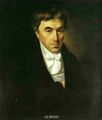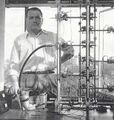Template:Selected anniversaries/December 22: Difference between revisions
No edit summary |
No edit summary |
||
| (12 intermediate revisions by the same user not shown) | |||
| Line 1: | Line 1: | ||
<gallery> | <gallery> | ||
|| *** DONE: Pics *** | |||
File:Cesare Cremonini.jpg|link=Cesare Cremonini (nonfiction)|1550: Philosopher and academic [[Cesare Cremonini (nonfiction)|Cesare Cremonini]] born. His work will promote rationalism (against revelation) and Aristotelian materialism (against the dualist immortality of the soul) inside scholasticism. | File:Cesare Cremonini.jpg|link=Cesare Cremonini (nonfiction)|1550: Philosopher and academic [[Cesare Cremonini (nonfiction)|Cesare Cremonini]] born. His work will promote rationalism (against revelation) and Aristotelian materialism (against the dualist immortality of the soul) inside scholasticism. | ||
||1640: Jean de Beaugrand dies ... lineographer of the seventeenth century. Though born in Mulhouse, de Beaugrand moved to Paris in 1581. He also worked as a mathematician and published works on geostatics. He is credited with naming the cycloid. No DOB. Pic: coat of arms. | |||
||1660: André Tacquet dies ... priest and mathematician ... adhered to the methods of the geometry of Euclid and the philosophy of Aristotle and opposed the method of indivisibles. Pic: book cover. | ||1660: André Tacquet dies ... priest and mathematician ... adhered to the methods of the geometry of Euclid and the philosophy of Aristotle and opposed the method of indivisibles. Pic: book cover. | ||
|| | ||1693: Elisabeth Catherina Koopmann Hevelius dies ... one of the first female astronomers, and called "the mother of moon charts". She was also the second wife of fellow astronomer Johannes Hevelius. Pic. | ||
||1693: Elisabeth | File:Elisabeth_Hevelius_(1673).png|link=Elisabeth Hevelius (nonfiction)|1693: Astronomer [[Elisabeth Hevelius (nonfiction)|Elisabeth Hevelius]] dies. One of the first female astronomers, Hevelius is known as "the mother of moon charts". | ||
File:Sir Richard Arkwright by Mather Brown 1790.jpg|link=Richard Arkwright (nonfiction)|1732: Inventor, engineer, and businessman [[Richard Arkwright (nonfiction)|Richard Arkwright]] born. Later in his life Arkwright will be known as the "father of the modern industrial factory system." | File:Sir Richard Arkwright by Mather Brown 1790.jpg|link=Richard Arkwright (nonfiction)|1732: Inventor, engineer, and businessman [[Richard Arkwright (nonfiction)|Richard Arkwright]] born. Later in his life Arkwright will be known as the "father of the modern industrial factory system." | ||
| Line 19: | Line 20: | ||
||1799: Nicholas Callan born ... priest and physicist. Best known for his work on the induction coil. Pic. | ||1799: Nicholas Callan born ... priest and physicist. Best known for his work on the induction coil. Pic. | ||
||1804: Louis François Clément Breguet born ... physicist and watchmaker, noted for his work in the early days of telegraphy. | ||1804: Louis François Clément Breguet born ... physicist and watchmaker, noted for his work in the early days of telegraphy. Pic. | ||
||1819: Pierre Ossian Bonnet born ... mathematician and academic. Pic. | ||1819: Pierre Ossian Bonnet born ... mathematician and academic. Pic. | ||
| Line 29: | Line 30: | ||
||1838: Chemist Markovnikov born. Markovnikov is best known for Markovnikov's rule, elucidated in 1869 to describe addition reactions of H-X to alkenes. According to this rule, the nucleophilic X- adds to the carbon atom with fewer hydrogen atoms, while the proton adds to the carbon atom with more hydrogen atoms bonded to it. Pic. | ||1838: Chemist Markovnikov born. Markovnikov is best known for Markovnikov's rule, elucidated in 1869 to describe addition reactions of H-X to alkenes. According to this rule, the nucleophilic X- adds to the carbon atom with fewer hydrogen atoms, while the proton adds to the carbon atom with more hydrogen atoms bonded to it. Pic. | ||
||1839: John Nevil Maskelyne born ... magician. | ||1839: John Nevil Maskelyne born ... stage magician and inventor of the pay toilet, along with other Victorian-era devices. He worked with magicians George Alfred Cooke and David Devant, and many of his illusions are still performed today. His book Sharps and Flats: A Complete Revelation of the Secrets of Cheating at Games of Chance and Skill is considered a classic overview of card sharp practices, and in 1914 he founded the Occult Committee, a group whose remit was to "investigate claims to supernatural power and to expose fraud". Pic. | ||
||1850: Constantin Fahlberg born ... chemist who discovered the sweet taste of anhydroorthosulphaminebenzoic acid in 1877–78 when analysing the chemical compounds in coal tar at Johns Hopkins University for Professor Ira Remsen. Pic. | |||
||1853: Evgraf Fedorov born ... mathematician, crystallographer, and mineralogist. Pic. | ||1853: Evgraf Fedorov born ... mathematician, crystallographer, and mineralogist. Pic. | ||
| Line 41: | Line 44: | ||
||1869: Dmitri Egorov born ... mathematician and academic ... known for significant contributions to the areas of differential geometry and mathematical analysis. Pic. | ||1869: Dmitri Egorov born ... mathematician and academic ... known for significant contributions to the areas of differential geometry and mathematical analysis. Pic. | ||
||1884: St. Elmo Brady | ||1872: Zdzisław Krygowski born - mathematician - has become famous in the history of cryptology for having assisted the Polish General Staff in setting up its cryptology course for Poznań University mathematics students that began on January 15, 1929. Pic search. | ||
||1884: St. Elmo Brady born ... African American chemist and educator. Pic. | |||
||1884: John Chisum dies ... wealthy cattle baron in the American West in the mid-to-late 19th century. Pic. | ||1884: John Chisum dies ... wealthy cattle baron in the American West in the mid-to-late 19th century. Pic. | ||
| Line 73: | Line 78: | ||
||1918: Edwin Evariste Moise born ... mathematician and mathematics education reformer. Pic. | ||1918: Edwin Evariste Moise born ... mathematician and mathematics education reformer. Pic. | ||
||1925: Amelie Beese dies ... pilot and engineer. Pic. | |||
||1925: Amelie Beese dies ... pilot and engineer. | |||
||1933: Thomas Greenway Stockham born ... scientist who developed one of the first practical digital audio recording systems, and pioneered techniques for digital audio recording and processing as well. Pic. | ||1933: Thomas Greenway Stockham born ... scientist who developed one of the first practical digital audio recording systems, and pioneered techniques for digital audio recording and processing as well. Pic. | ||
| Line 81: | Line 84: | ||
||1942: World War II: Adolf Hitler signs the order to develop the V-2 rocket as a weapon. | ||1942: World War II: Adolf Hitler signs the order to develop the V-2 rocket as a weapon. | ||
||1943: | ||1943: Physicist Henri Abraham arrives at concentration camp, probably killed on arrival. He made important contributions to the science of radio waves. He performed some of the first measurements of the propagation velocity of radio waves, helped develop France's first triode vacuum tube, and with Eugene Bloch invented the astable multivibrator. Pic. | ||
||1961: William "Bud" Uanna dies ... American security expert, who gained prominence as a security officer with the Manhattan Project, which built the first atomic bomb during World War II. Uanna was in charge of security at the project's facility at Oak Ridge, Tennessee, and later at the 509th Composite Group, which dropped atomic bombs on Hiroshima and Nagasaki. After the war, he headed the Atomic Energy Commission (AEC) program to provide security clearances to its personnel, and developed the top-secret Q clearance. He later served as chief of physical security at the State Department. Pic. | |||
||1964: The first test flight of the SR-71 (Blackbird) took place at Air Force Plant 42 in Palmdale, California. | ||1964: The first test flight of the SR-71 (Blackbird) took place at Air Force Plant 42 in Palmdale, California. | ||
|| | File:Norman Lorimer Dean with his Dean drive.jpg|link=Norman Lorimer Dean (nonfiction)|1972: Inventor [[Norman Lorimer Dean (nonfiction)|Norman Lorimer Dean]] dies. Dean designed the Dean drive, which he promoted as a reactionless drive. | ||
||2000: Herman Feshbach dies ... physicist. He was an Institute Professor Emeritus of physics at MIT. Feshbach is best known for Feshbach resonance and for writing, with Philip M. Morse, Methods of Theoretical Physics. Pic search | ||1996: Jack Hamm dies ... cartoonist and television host. Pic search. | ||
||2000: Herman Feshbach dies ... physicist. He was an Institute Professor Emeritus of physics at MIT. Feshbach is best known for Feshbach resonance and for writing, with Philip M. Morse, Methods of Theoretical Physics. Pic search. | |||
||2003: Wah Ming Chang born ... designer, sculptor, and artist. With the encouragement of his adopted father, James Blanding Sloan, he began exhibiting his prints and watercolors at the age of seven to highly favorable reviews. Chang worked with Sloan on several theatre productions and in the 1940s, they briefly created their own studio to produce films. He is known later in life for his sculpture and the props he designed for Star Trek: The Original Series, including the tricorder and communicator. Pic. | ||2003: Wah Ming Chang born ... designer, sculptor, and artist. With the encouragement of his adopted father, James Blanding Sloan, he began exhibiting his prints and watercolors at the age of seven to highly favorable reviews. Chang worked with Sloan on several theatre productions and in the 1940s, they briefly created their own studio to produce films. He is known later in life for his sculpture and the props he designed for Star Trek: The Original Series, including the tricorder and communicator. Pic. | ||
||2014: John Robert Beyster dies ... physicist and academic. Pic search | ||2014: John Robert Beyster dies ... physicist and academic. Pic search. | ||
||2016: Jack Howard Silver dies ... set theorist, logician, and academic.He made several contributions to set theory in the areas of large cardinals and the constructible universe L. Pic. | ||2016: Jack Howard Silver dies ... set theorist, logician, and academic.He made several contributions to set theory in the areas of large cardinals and the constructible universe L. Pic. | ||
</gallery> | </gallery> | ||
Latest revision as of 18:29, 7 February 2022
1550: Philosopher and academic Cesare Cremonini born. His work will promote rationalism (against revelation) and Aristotelian materialism (against the dualist immortality of the soul) inside scholasticism.
1693: Astronomer Elisabeth Hevelius dies. One of the first female astronomers, Hevelius is known as "the mother of moon charts".
1732: Inventor, engineer, and businessman Richard Arkwright born. Later in his life Arkwright will be known as the "father of the modern industrial factory system."
1765: Mathematician Johann Friedrich Pfaff born. He will work on partial differential equations of the first order Pfaffian systems, as they are now called, which will become part of the theory of differential forms.
1858: Composer Giacomo Puccini born. He will be called "the greatest composer of Italian opera after Verdi".
1887: Mathematician and theorist Srinivasa Ramanujan born. He will make substantial contributions to mathematical analysis, number theory, infinite series, and continued fractions, including solutions to mathematical problems considered to be unsolvable.
1894: The Dreyfus affair begins in France, when Alfred Dreyfus is wrongly convicted of treason.
1972: Inventor Norman Lorimer Dean dies. Dean designed the Dean drive, which he promoted as a reactionless drive.








